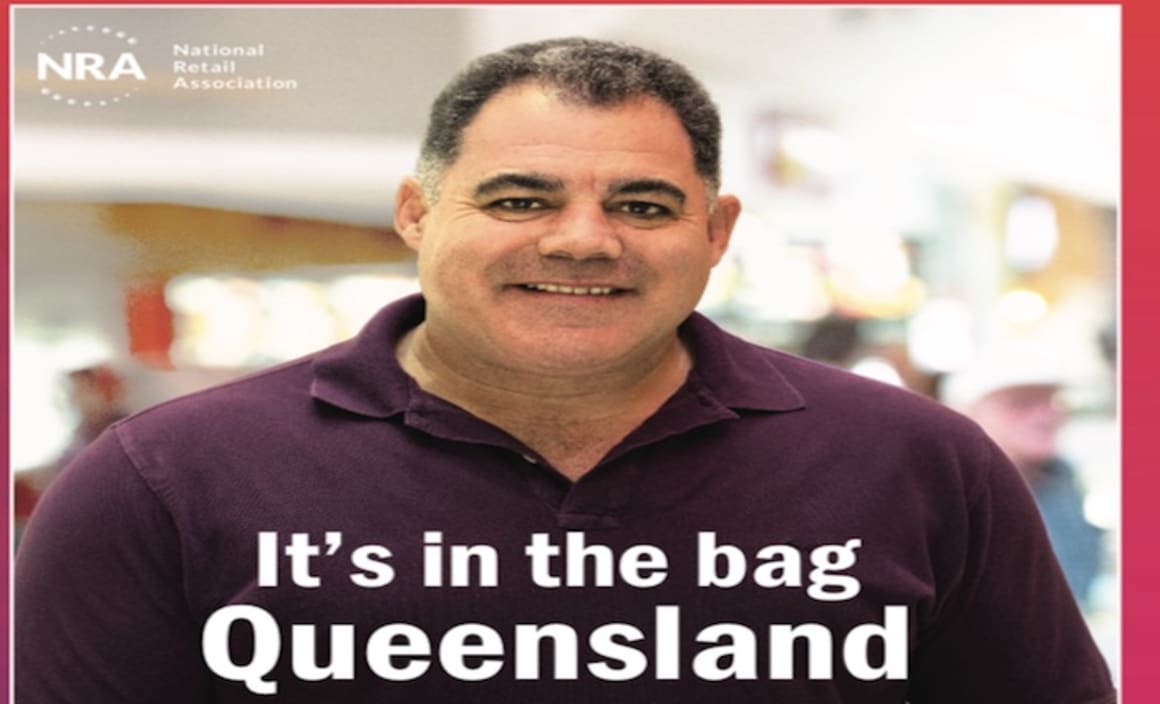Queensland rugby legend Mal Meninga joins retailers to fight toxic bag pollution

Queensland great Mal Meninga will be on the hustings in Brisbane today, as he joins forces with the National Retail Association (NRA) to launch a state-wide campaign calling on consumers to get behind the Queensland Government’s July 1 ban on single-use lightweight plastic shopping bags.
The Bundaberg-bred coach, businessman and speaker, who grew up on the state’s treasured coastal areas, said tackling plastic pollution should be a priority for everyone who calls the Sunshine State home.
“The number of plastic shopping bags used by Queenslanders is nearing a billion each year – most of which are used for only a short period of time and go to landfill,” Meninga said.
“But around 16 million of these bags are littered and end up in our precious environment. The equivalent in weight to 96 small cars’ worth of plastic bags wind up in our environment where they wreak havoc on the local ecosystem, our waterways and our marine life.
“We simply cannot afford to stand by and let this scourge on our environment continue,” he said.
NRA CEO Dominique Lamb said retailers had long-supported the idea of industry-wide action to try and combat toxic plastic bag pollution, however those who’d launched their own bans had often found it tough getting customers to embrace the idea.
“Our industry is behind the State Government for making this a non-negotiable for all stores right down to the smallest takeaway outlets, local markets and online stores, as it’s a crucial step toward changing overall consumer behaviour,” Ms Lamb said.
Following the advent of high-density polyethylene plastic in the 1950s, and the introduction of the first throwaway bags in the late 1960s and 70s, global plastic bag production has reportedly reached around 5 trillion bags every year – around 160,000 per second.
Without radical action by consumers and producers, the volume of accumulated plastic in the oceans is forecast to become greater than that of fish by 2050, according to a 2016 report by the World Economic Forum.
“We know we’ve reached a tipping point and the retail industry is right in the thick of it as consumers demand more transparency into how the products they buy are produced, so they can support brands with ethical production methods and environmentally sustainable practices. Banning lightweight plastic shopping bags is another important step in creating a future-proof industry,” she said.
From July 1, no retailer in Queensland will be allowed to hand out single-use lightweight plastic shopping bags under 35 microns thick, or they risk fines of more than $6000 per offence.
“Consumers will need to prepare by either bringing their own reusable bags, and should expect to pay a small fee of around 15 to 20 cents for a basic reusable option, through to as much as five dollars for locally-made jute or hessian bag.”
Ms Lamb has also asked shoppers to be patient with retailers throughout the transition period, while they adjusted to new bags and processes.
“It’s up to all of us to do our bit. It’s a small change in our routine for a big impact on Queensland’s environment,” she said.